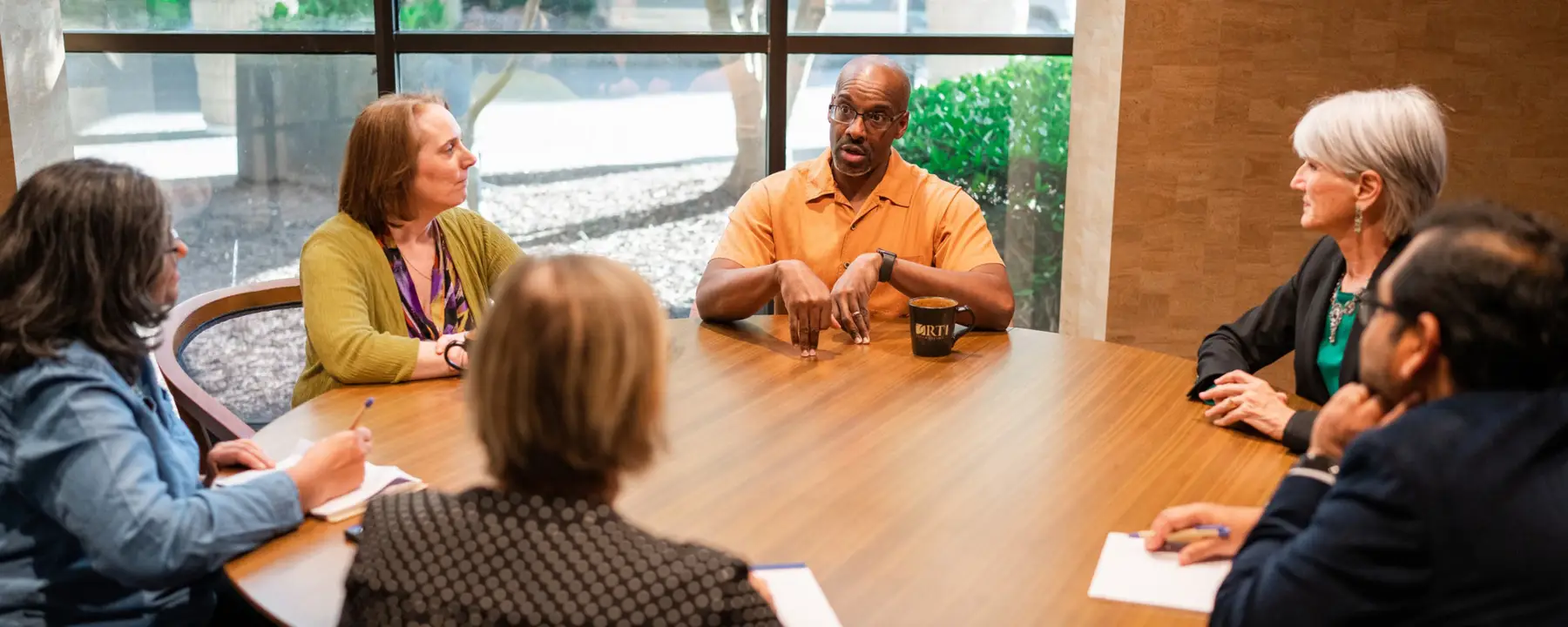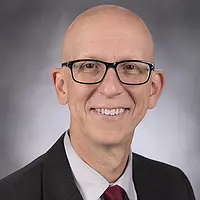RTI Fellow Program focuses on inclusion and open science as pathways to greater impact
The RTI Fellow Program sponsors a group of distinguished scientists striving to build a better global future. The distinction of RTI Fellow has historically been the highest scientific honor and responsibility RTI bestows on its staff; during 2023, the Program re-evaluated its priorities and re-affirmed its mission to build a better global future by conducting high impact research, mentoring the next generation of scientific leaders, and fostering a culture of inclusive and innovative science at RTI.
“Fellows care deeply about improving the human condition through science and its application in the world,” RTI Fellow Program Chair Eric Otto Johnson, PhD, says. “Beyond leading our own projects, representing RTI on external committees and advisory boards, and numerous presentations and publications that help drive scientific innovation and shape policy, we provide mentoring and support to early career staff in their journeys to build careers and impact the world for good. We also seek to contribute to RTI’s initiatives delivering on the promise of science-based solutions through seminars, lectures, and other events.”
Three 2023 projects demonstrate these values, which are integral to RTI’s mission of improving the human condition:
High-impact research
The National Institute of Heath’s (NIH) All of Us Research Program is working toward the goal of collecting data from at least one million people to build one of the most diverse health databases in history. All of Us data is made publicly available to drive innovations in precision medicine and improve human health. RTI is leading two large projects in partnership with the NIH and other academic and community partners that serve All of Us in distinct ways.
In the first project, led by Senior Fellow Megan Lewis, PhD, and Jennifer Uhrig, PhD, RTI serves as an All of Us Engagement and Retention Innovator. One of the All of Us Research Program’s goals is to engage members of populations historically underrepresented in biomedical research to ensure that scientific advances apply broadly to communities across the United States. Following in-depth research, community co-creation workshops, and design phases, RTI is collaborating with All of Us consortium partners to develop and test novel digital solutions to support engagement with and informed decision-making about joining the program. These solutions center community needs and advance communication and user-centered design practices to support All of Us.
Another goal of the All of Us Research Program is to democratize access to the cohort data housed in the All of Us Researcher Workbench. To support this goal, the project team created the All of Us Researcher Academy, which provides training, technical assistance, peer-to-peer learning, and network-building to support researchers underrepresented in the biomedical workforce to use All of Us data. To date, RTI partnered with twelve Historically Black Colleges and Universities to make data access more equitable. According to Dr. Lewis, “With funding from the All of Us Research Program’s Division of Engagement and Outreach our team has made important contributions to the program to ensure that community needs are reflected in the novel digital solutions we are developing to support on-going engagement and program enrollment. In addition, the Researcher Academy is at the forefront of building an actionable model for data democratization and equitable data access.”
On the second project, Senior Fellow Marie Gantz, PhD, works with All of Us in a different capacity, leading the Research Coordinating Center (RCC) for All of Us’ first large ancillary study, Nutrition for Precision Health (NPH). The RCC is a partnership with Cornell University’s Division of Nutritional Sciences. Since 2022, they have been coordinating the NPH consortium activities and data flow across the 15 funded centers and the NIH. NPH is a modular clinical trial that uses recent innovations in biomedical research—such as artificial intelligence and microbiome research—to study individual responses to foods and dietary routines in 10,000 All of Us participants and then develop predictive algorithms for use in clinical settings.
The RCC coordinated development of the NPH protocol in the consortium’s first year and launch of the three study modules in year 2. They oversaw development of study procedures, trainings, and recruitment assets and programmed systems for collecting clinical and participant-reported data and for ingesting a dozen external sources of data, including wearables, dietary assessments, and laboratory data. The RCC is responsible for curating all NPH data and submitting them for inclusion in the Researcher Workbench where they will be available to the research community along with data from the parent All of Us study.
Mentorship for the next generation
All 33 RTI Fellows nurture and grow the next generation of scientists, both within and outside RTI, through collaborative manuscript development, research guidance, and career development support to mentees. They also identify early career staff with the potential to become Fellows.
Senior Fellow Megan Comfort, PhD, working in RTI’s Transformative Research Unit for Equity (TRUE), and her TRUE colleague Monica Sheppard, created the Emerging Equity Scholars (EES) program to mentor early-career RTI staff that are from groups historically excluded from and currently othered in research careers due to systemic racism and other forms of structural oppression.
They launched a twelve-month pilot in 2023, pairing four scholars — Trey-Rashad Hawkins, Marque Long, Megan Nyce, and Manuella Messie — with both research and wellbeing mentors. In this model of “holistic mentorship,” research mentors guide scholars in developing their research-related skills while wellbeing mentors support scholars in navigating workplace culture, accessing resources, and fostering emotional and physical health. During the program, the EES scholars also designed and completed an Equity Project that expanded their expertise and advanced RTI’s efforts towards equity-centered research.
The EES program consisted of five modules: Rest, Reimagine, Reinvigorate, Grow, and Shine. Through these modules the program sought to learn from the experiences of systemically othered groups in research, foster community, connection, and support, and give scholars the opportunity to lead impactful research. At the end of the program, the scholars presented their research projects to Equity Projects to nearly 200 RTI colleagues.
“It’s this lovely moment of showcasing what can happen when you give early-career people space, support, and time to think outside the box and develop something new,” Comfort says.
Feedback from pilot cohort scholars and mentors has been positive. Scholars have stepped into new roles that leverage their equity-centered research skills, and mentors are applying EES concepts and approaches within their other teams at RTI. Comfort and Sheppard are continuing to build out EES’ holistic mentorship model as they plan for a new cohort to begin in 2025.
Culture of inclusive and innovative science
In the summer of 2023, the RTI Fellows Program invited Nancy Potok and Julia Lane to serve as Visiting Fellows for a one-year term. Both are experts in data democratization – the use of public-sector data for the benefit of the scientific community. Potok is a statistician with more than 30 years of experience in the public, private, and nonprofit sectors, including as the Chief Statistician of the United States, Deputy Director and Chief Operating Officer of the U.S. Census Bureau, and Deputy Under Secretary for Economic Affairs at the U.S. Department of Commerce. Lane, a professor at the Robert F. Wagner School of Public Policy at New York University, played a key role in the development of many large-scale public data infrastructures and served as a senior advisor in the Office of the Federal CIO at the White House.
Most recently, Potok and Lane have led the development of the Democratizing Data pilot project. The project’s immediate goal has been to apply machine learning models to find how federally funded datasets are used by the scientific community — by what researchers, from which institutions, to answer what questions. The results can be used by agencies to respond to the 2018 Foundations of Evidence based Policy-making Act, which requires agencies to produce data inventories and report data usage information. The results can also help a diverse community of researchers search for and find relevant data and other researchers. The long-term goal is to recognize the value of the production and curation of datasets at the same level as the production of publications. The platform and associated workshops could serve as an initial catalyst for achieving this goal by both building a diverse community of researchers around existing data and creating incentives for them to contribute to the curation and dissemination of quality data sources.
The Visiting Fellows will use their fellowship to help RTI staff become familiar with the Democratizing Data platform as well as their broader goal of democratizing data.

